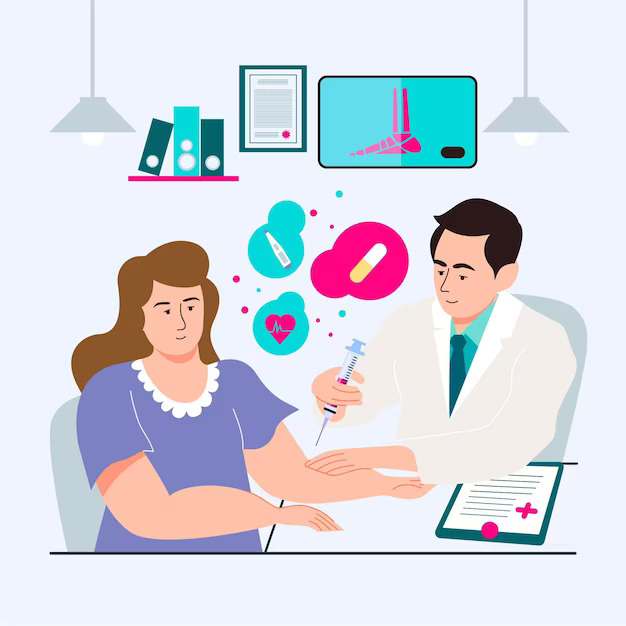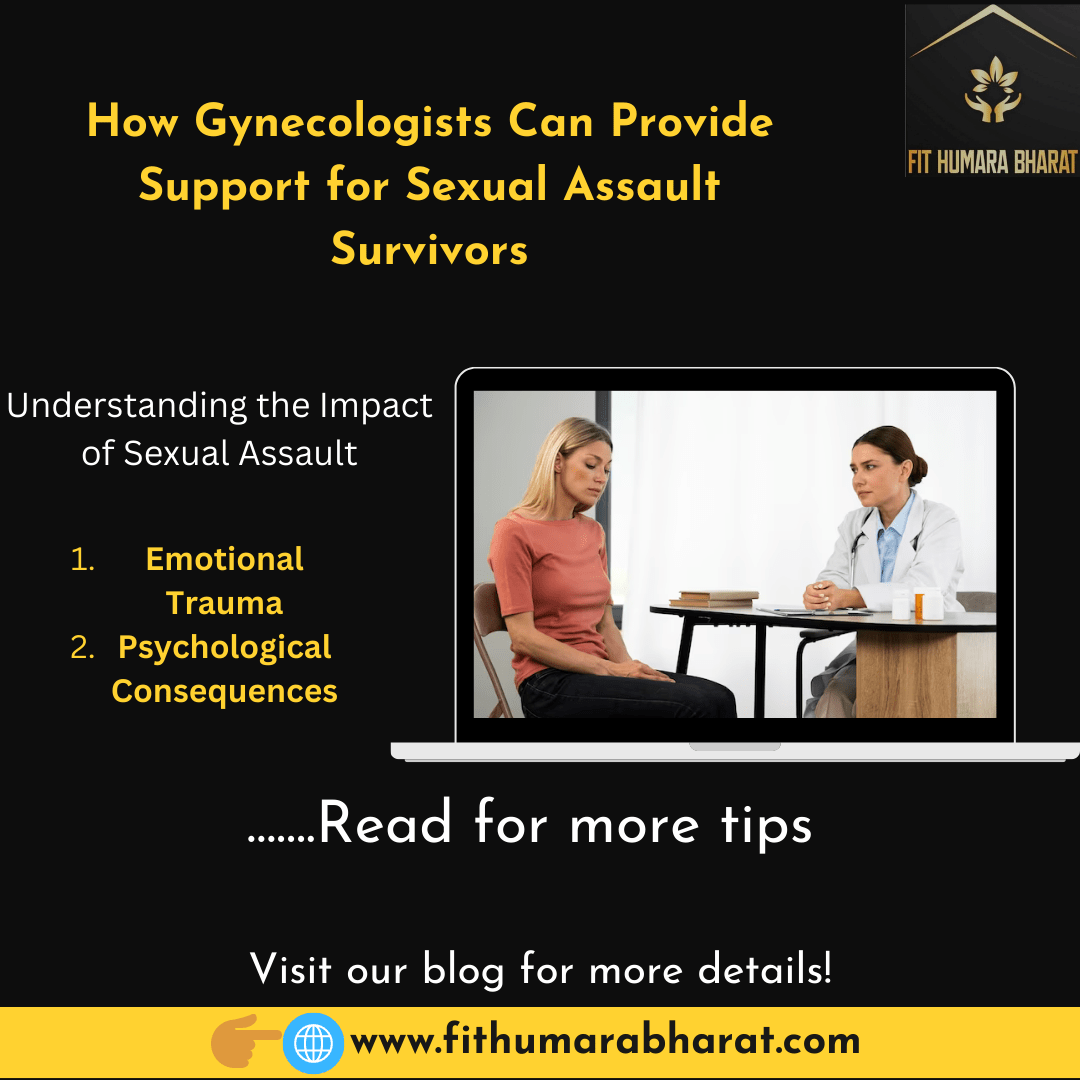Sexual assault is an upsetting experience that leaves severe psychological, emotional, and physical results for survivors. As medical experts specializing in women’s health, gynaecologists are crucial in supporting sexual assault survivors during their healing process. This article focuses on discovering how gynaecologists can give detailed and compassionate care to survivors and solve their emotional and physical requirements.

Stats on how frequent is sexual assault?
Sadly, sexual assault is widespread in every part of the world and stays a major global issue. Approximately 19% of females surveyed stated that they have faced sexual assault in their lifetime, although several cases are not reported. According to statistics, sexual assault is more common among younger females. Some researchers have also mentioned an incidence as higher as 25% among teens or college-going girls.
Understanding the Impact of Sexual Assault
Sexual assault is a terrible crime that causes lasting and deep wounds on its survivors. To give actual support, gynaecologists should have a detailed knowledge of the deep impact this suffering has on survivors’ psychological, emotional, and physical health.
- Emotional Trauma: Sexual assault survivors usually go through many intense emotions, like confusion, anger, guilt, shame, and fear. The defilement of their limitations and the betrayal of trust by the culprit can cause a sense of weakness and helplessness. As gynecologists’, recognizing and confirming these feelings is crucial to developing trust and connecting with survivors.
- Psychological Consequences: The psychological outcome of sexual harassment can be extensive and intricate. Plenty of survivors experience PTSD or post-traumatic stress disorder, which can be visible in flashbacks, nightmares, and intrusive memories. Also, survivors may develop depression, anxiety disorders or other mental/emotional health issues. Accepting these psychological results enables gynaecologists to tackle survivors sensitively and adjust their treatment solutions accordingly.
- Impact on Intimate Affairs: Sexual assault can rigorously influence the ability of survivors to build and maintain intimate relations. The suffering may also cause problems with vulnerability, intimacy, and trust, making it hard to develop healthy bonds with others. Gynaecologists should understand these difficulties because they can affect survivors’ sexual and reproductive health decisions.
- Physical Indicators of Trauma: The ordeal of sexual assault can be evident physically, commonly causing chronic pain and gynaecological issues. Survivors may also experience gynaecological conditions, pelvic pain, and sexual dysfunctions caused by the assault. Therefore, Gynecologists should know these physical signs to offer the right medical interventions and care.
- Self-Blame and Coping Mechanisms: Survivors may cultivate coping mechanisms to handle the outcomes of the assault, like engaging in dangerous behaviours or self-isolation. Some survivors may also blame themselves internally for the assault, causing emotions of self-destructive tendencies and worthlessness. Identifying these coping mechanisms and the inclination towards self-blame is crucial to support survivors in their treatment journey.
- Long-Term Impact: Sexual assault can leave permanent blemishes on survivors and affect different aspects of their lives for many years. Gynaecologists should realize that the influences of trauma may not be quickly visible and that survivors may need continuous care and support.
Creating a Safe and Empathetic Environment
Creating an empathetic and safe environment in the gynaecological setting is crucial to support sexual assault survivors better. Gynecologists’ should respect the confidentiality of the survivor, listen to them actively without judgment, and offer validation and empathy. Gynecologists’ can use trauma-informed care approaches and assist survivors in reclaiming a sense of independence and control over their bodies throughout medical procedures and examinations.
Training and Sensitivity
Gynaecologists should obtain specialized training in dealing with cases of sexual harassment. This training should incorporate considering the dynamics of sexual assault, identifying the signals of trauma, and knowing the accessible resources for survivors. Sensitivity towards the exceptional requirements of survivors is vital because some survivors may have anxiety or triggers associated with gynaecological exams.
Immediate Survivor Needs
Despite the emotional support, a responsible gynaecologist can also give complete medical assistance to survivors. That consists of conducting thorough medical exams, testing for STIs or sexually transmitted infections, and solving any gynaecological problems caused by the assault. Gynaecologists should teach survivors about accessible treatment methods and empower them to make well-versed decisions to improve their health.
Longer-term Survivor Needs
In several instances, survivors don’t report sexual abuse immediately or receive the support and resources they require afterwards. Mostly, many survivors don’t even tell anyone about their experience until several years.
Though their sexual abuse happened in the past, survivors can feel relaxed and disclose this experience to their gynaecologist.
Talking to a gynaecologist is very helpful for survivors to find resources and treatments that could improve their life’s quality – especially if they know that their past experiences have a permanent impression on their intimate relationship with their partner.
You know that female sexuality is intricate; however, several women find development in their life with treatment solutions suggested by their gynaecologists. These treatment methods can consist of couples therapy, pelvic floor physical therapy, workout, or medications.
Collaborating with Mental Health Professionals
The treatment method for sexual harassment usually involves seeking emotional health support. Gynaecologists have a collaborative role to play and refer sexual assault survivors to professional counsellors or therapists with proficiency in sexual assault and trauma. Maintaining healthy communication with emotional/mental health experts is helpful to ensure a holistic way to survivors’ health.
Advocacy and Support Networks
Gynaecologists can vigorously advocate survivors’ moralities and add to social support networks. By communicating closely with local support groups or support groups, gynaecologists can also assist survivors in accessing extra resources, like crisis hotlines, legal assistance and support for permanent recovery.
Conclusion
In conclusion, gynaecologists have a crucial role in supporting sexual assault survivors by giving them trauma-informed, comprehensive, and empathetic care and treatment.
Gynaecologists can be a crucial source of empowerment and healing by advocating for survivors’ rights, working with mental health experts, offering specialized training, and creating safe environments.
Together, with a united effort from society and the medical community as a whole, gynaecologists can work towards breaking the ice and giving firm support to sexual assault survivors so that they can recover fast and live their life in peace.
Thank You 
- Psychotherapy with Survivors of Sexual Abuse and Assault
- Sexual assault and posttraumatic stress disorder: A review of the biological, psychological and sociological factors and treatments
- Sexual Abuse and Lifetime Diagnosis of Psychiatric Disorders: Systematic Review and Meta-analysis
- The General Approach and Management of the Patient Who Discloses a Sexual Assault
- Sexual assault: women’s voices on the health impacts of not being believed by police



 Sources
Sources